
From the left: Dr. Karl Schmidseder, the military commander of Vienna, Minister Norbert Darabos, Austrian Minister for Defence and Sports, Sonja Wintersberger, and Mr. Stefan Hirsch.
“How much have the Austrian peacekeeping missions cost Austria yearly and in total since 50 years?”
Norbert Darabos, the Austrian Minister for Defence and Sports answered my question 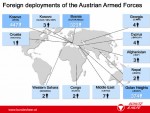 during a press conference on the “50th Anniversary of Austrian Peacekeeping mission” held by the Austrian Ministry of Defence and Sports in cooperation with UNIS at the Heldenplatz – (Heroes Square) in Vienna. He said: “This is a difficult question. During the last 50 years, about 90,000 Austrian servicemen and women were sent to do peacekeeping missions in 114 different countries. It is not easy to give a number for the cost which the implementation of the UN peace keeping missions has been incurred by Austria, because the United Nations has paid back most of these costs”. “click on this picture to make it bigger”.
during a press conference on the “50th Anniversary of Austrian Peacekeeping mission” held by the Austrian Ministry of Defence and Sports in cooperation with UNIS at the Heldenplatz – (Heroes Square) in Vienna. He said: “This is a difficult question. During the last 50 years, about 90,000 Austrian servicemen and women were sent to do peacekeeping missions in 114 different countries. It is not easy to give a number for the cost which the implementation of the UN peace keeping missions has been incurred by Austria, because the United Nations has paid back most of these costs”. “click on this picture to make it bigger”.
He added: “We try to keep the money and resources used in these missions in accordance to the possibilities of the army. It is about 50 – 60 million Euro each year”.
The press conference was moderated by Mr. Stefan Hirsch, spokesperson of the Austrian Ministry of Defence and Sports one day before the celebration of the Austrian National day on October 26 2010. Brig-Gen. Dr. Karl Schmidseder, the military commander of Vienna, and Ms. Sonja Wintersberger on behalf of Yury Fedotov, Director-General of the United Nations Office at Vienna (UNOV) took part in the press conference next to minister Darabos.
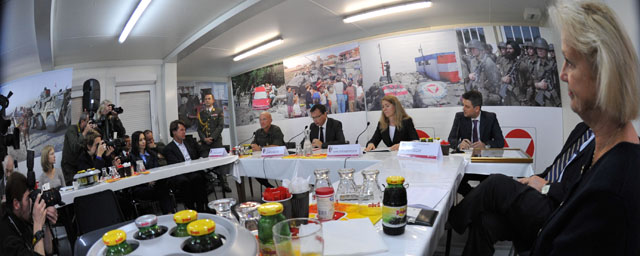
Minister Darabos stated in a brief that Austria is contributing to joint international peace keeping effort. Since 1960, more than 90,000 Austrian troops and civilian helpers have been participating in more than 50 international peace support and humanitarian missions. Since the end of the Cold War the number of missions has been growing rapidly. In addition to classical peace-keeping or peace support operations there are now a growing number of humanitarian and disaster relief operations to be taken care of.
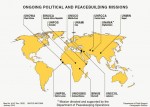 He added: “since 1989, which marked the end of the east-west conflict, the number of peace support operations has been growing rapidly. In 1992, the UN Secretary-General initiated the Stand-by Arrangement System under the “Agenda for Peace” to meet growing costs for the ever increasing number of missions. Meanwhile, this system has been adopted for peace support and humanitarian operations run by other international organizations. “Click on this picture to make it bigger”.
He added: “since 1989, which marked the end of the east-west conflict, the number of peace support operations has been growing rapidly. In 1992, the UN Secretary-General initiated the Stand-by Arrangement System under the “Agenda for Peace” to meet growing costs for the ever increasing number of missions. Meanwhile, this system has been adopted for peace support and humanitarian operations run by other international organizations. “Click on this picture to make it bigger”.
A colleague also asked about the budget of Austrian Army, if they rely on income from cooperation with private companies. Minister Darabos said that the Austrian army relies on money allocated within the budget of the government, and that while co-operations with private companies exist and generate income, this is vey small. Minister Darabos mentioned that the budget allocated to the army with the new federal budget had decreased by about 3,5%, what means that the next few years until 2014 they will have 530 millions Euros less at their disposition. He stated that this still compared favorably to other armies, like Spain and Portugal, which have seen their budgets reduced by up to 30%.
Golan Heights:
“How long will the Israeli occupation stay in the Syrian territory of the Golan Heights?” This was another question which I asked to Minister Darabos. The Minister answered my question in a diplomatic and a very polite way. He said: “Our peace mission is being implemented according to an agreement and this question should be asked to the foreign minster, but in any case the Austrian army will continue implementing its mission in neutral way and without partisanship for one or the other side”. He added: “Both sides have had positive words about the presence and the work of the Austrian army in the Golan Heights, and this is reflected in the fact that until recently the commander of this (multinational) force was an Austrian officer”.
Minister Darabos also said that he had understood what I wanted to imply politically, but he would not comment about that. Referring to the israeli occupation of the Golan heights, he said “This is a political issue and it should be resolved by political ways”.
Women in the Austrian army:
Answering the question of a colleague, Minister Darabos said that he is happy of what the women are doing in the army but that he is not happy because there are not enough women in the army, that ONLY 3% of the Austrian troops are women. He added: “we are trying to implement supporting measures which could bring more women to the army, and I am waiting for the day when the first woman will attend the course for a general staff position.
During the press conference minister Darabos handed Sonja Wintersberger a certificate about a special postage stamp collection entitled “Peace mission of the Austrian soldiers”. The post stamps show motifs painted by children from Kosovo and Bosnia about the issue off “peace, UN and Austria”. The stamp was issued to mark the 50th anniversary of the Austrian Armed Forces participation in the international peacekeeping operations.
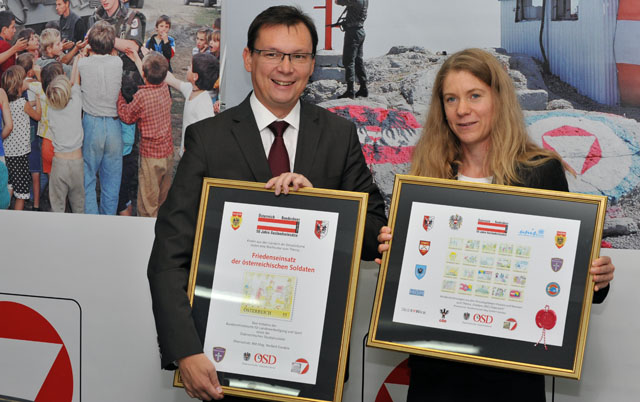
Left: Minister Norbert Darabos and Sonja Wintersberger.



Possibly related posts (automatically generated):
- From the Irish Minister for Foreign Affairs From: “Danielle [dot] Kelly [at] dfa [dot] ie”
To: kawther_salam [at] yahoo [dot]... - Would Barak Have Protested if he Knew Who I Am? Read in German. See more Photos. Yesterday, the Israeli minister of war Ehud Barak, the Israeli commander of the occupation...
- OFID Dr. Suleiman J. Al-Herbish, Director-General of the OPEC Fund for International Development (OFID) OFID The OPEC Fund for International...
- Gadi Shamni Gadi Shamni during a tour of Hebron, in 1996 or 1997 (click photo). In Hebron, my homeland, I met Major...
- Yehuda Fuchs The State of Israel is a State without morals. Israel is a State of occupiers and executioners. The Israeli army...







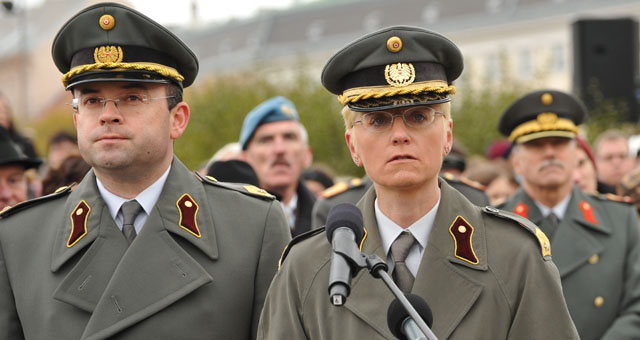



No comments:
Post a Comment